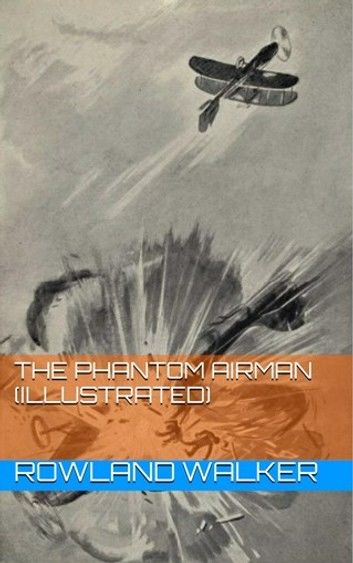| FindBook |
有 1 項符合
The Phantom Airman (Illustrated)的圖書 |
 |
The Phantom Airman (Illustrated) 作者:Rowland Walker 出版社:Lost Leaf Publications 出版日期:2013-07-23 語言:英文 |
| 圖書館借閱 |
| 國家圖書館 | 全國圖書書目資訊網 | 國立公共資訊圖書館 | 電子書服務平台 | MetaCat 跨館整合查詢 |
| 臺北市立圖書館 | 新北市立圖書館 | 基隆市公共圖書館 | 桃園市立圖書館 | 新竹縣公共圖書館 |
| 苗栗縣立圖書館 | 臺中市立圖書館 | 彰化縣公共圖書館 | 南投縣文化局 | 雲林縣公共圖書館 |
| 嘉義縣圖書館 | 臺南市立圖書館 | 高雄市立圖書館 | 屏東縣公共圖書館 | 宜蘭縣公共圖書館 |
| 花蓮縣文化局 | 臺東縣文化處 |
|
|
Contents:
CHAPTER
The Secret of the Schwarzwald
The Wonder 'Plane
"Tempest" of the Aerial Police
A Midnight Consultation
The Aerial Liner
An Up-to-Date Cabin Boy
A Duel with Words
Sons of the Desert
The Phantom Bird
The Brigand of the Eastern Skies
The Air-King's Tribute
The Maharajah's Choice
The Missing Airship
Betrayed by the Camera
Diamond cut Diamond
The Ghostly Visitant
The Watchers
"Live Wires"
The Devil's Workshop
"Hands Up!"
The Coming Fight
An Aerial Duel
CHAPTER I
THE SECRET OF THE SCHWARZWALD
Rittmeister Heinrich von Spitzer, late flight-commander in the German Air Service, was one of the Prussian irreconcilables, who, rather than submit to the peace terms enforced by the Allies after the defeat of Germany, resolved to become an aerial brigand, an outlaw of the nations, and to wage a bitter warfare of violence and plunder against his late enemies.
His proud spirit refused to bend before the conquerors, for the iron shaft of defeat had embittered his soul, particularly against Britain, whom he had ever regarded as the evil genius of the Entente.
One day, when his plans were well matured, he unburdened his spirit to a couple of his friends, kindred souls, men after his own heart, both of them apt pupils of the great Richthofen, who was still referred to by his disciples as "the red airman." They had been engaged that day in dismantling an aerodrome on the edge of the Schwarzwald; to them, at least, a hateful job.
"Comrades," he said, "this peace has ruined us. Germania delenda est, but I will not sit still amid the ruins of the Fatherland. Glorious we have lived, like kings of the air; let us not inglorious die."
"I am with you, Rittmeister. I will follow you to the gulfs," exclaimed one of his companions, named Carl, who had been a famous scout pilot in the Richthofen "circus," and the lightning flashed from the young airman's eyes as he spoke.
"But what can we do against the empires of the world?" asked a Gotha pilot who had raided the English towns a score of times.
For answer the chief turned a withering look upon the last speaker and said:--
"Max, you have faced death a hundred times in the air, and over the British lines. You have thirty enemy machines to your credit, and yet you ask me what can we do?"
"What of it, Rittmeister? Tell us what is in your mind."
"Listen, then, both of you, and I will tell you what still remains for brave men to do. All is not lost while courage and hope remain," and whilst he spoke the German chief drew his two friends away from the half-dismantled aerodrome on the southern edge of the Schwarzwald, to a narrow path that led amongst the trees.
When the aerodrome was hid from view he began to speak once more, huskily at first, as though restraining some pent up excitement.
"I am in possession of a secret," he said, "which I may not tell even to you unless you first swear to follow me on some great adventure."
They both looked at him, not a little amazed and bewildered, and neither spoke for a moment.
"I have chosen you," continued Spitzer, "because I know you to be men of daring and resource. You are both dissatisfied with the condition of things in the Fatherland. Ach Himmel! This occupation of the sacred German soil by the Britisher, the Frenchman and the American is breaking my heart. I will endure it no longer, but I will strike a blow at the enemy before I die."
As he spoke thus, he almost hissed out the words which he uttered, for his voice had now lost its strange huskiness, while his eyes gleamed like the fierce glittering orbs of the tiger about to make its spring from the hidden jungle. Nor was his present madness without its visible effect upon his two companions, for he had strange powers of magnetic influence, this Prussian Junker.
"Donner and Blitz, but you are right, Rittmeister!" exclaimed Carl, the blood mounting to his temples.
"And you, Max, what say you?" and the chief fixed the Gotha pilot with his eyes.
"Ja! ja!" he assented. "I am with you also."
"But the end of this adventure is death!" continued von Spitzer, speaking now more deliberately. "This much I must tell you in all fairness before I proceed further. However much we achieve--and we shall accomplish not a little--there can be no other ending."
"Bah! we have looked too often into the face of that monster to be afraid," returned the scout.
"You speak truly, Carl," replied the chief. "When your machine went down in flames near Cambrai, you passed so close to me that I stalled my Fokker to let you pass, and I saw the smile upon your lips that day as you looked into the face of death. I never expected to see you alive again, but you were saved for this."
|











